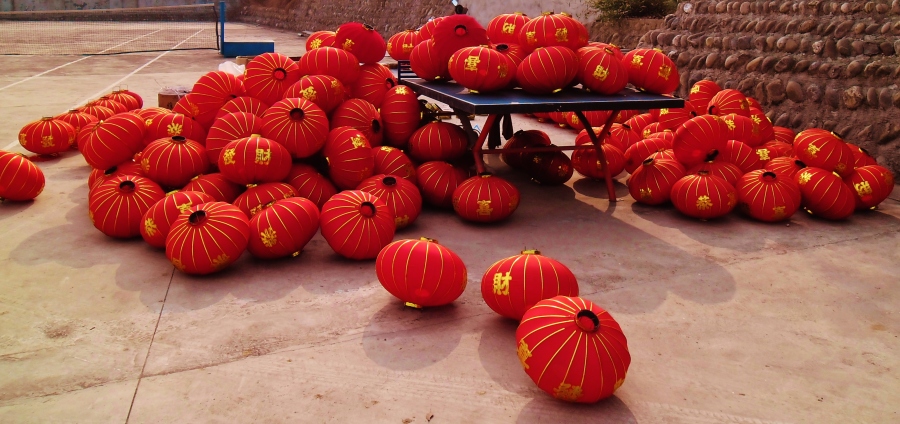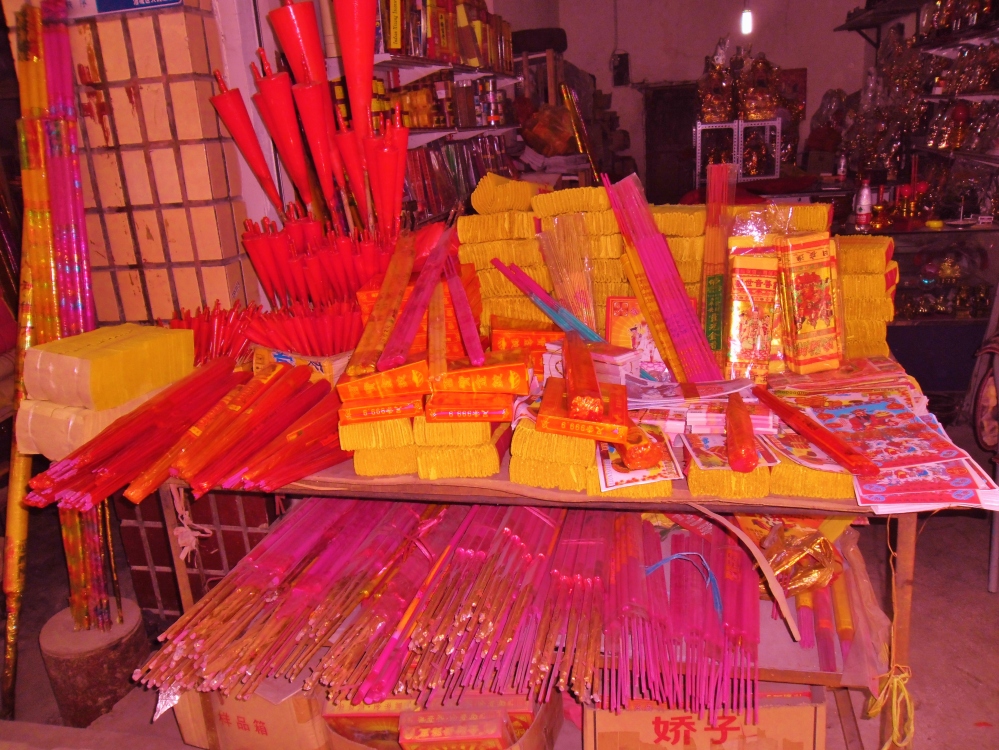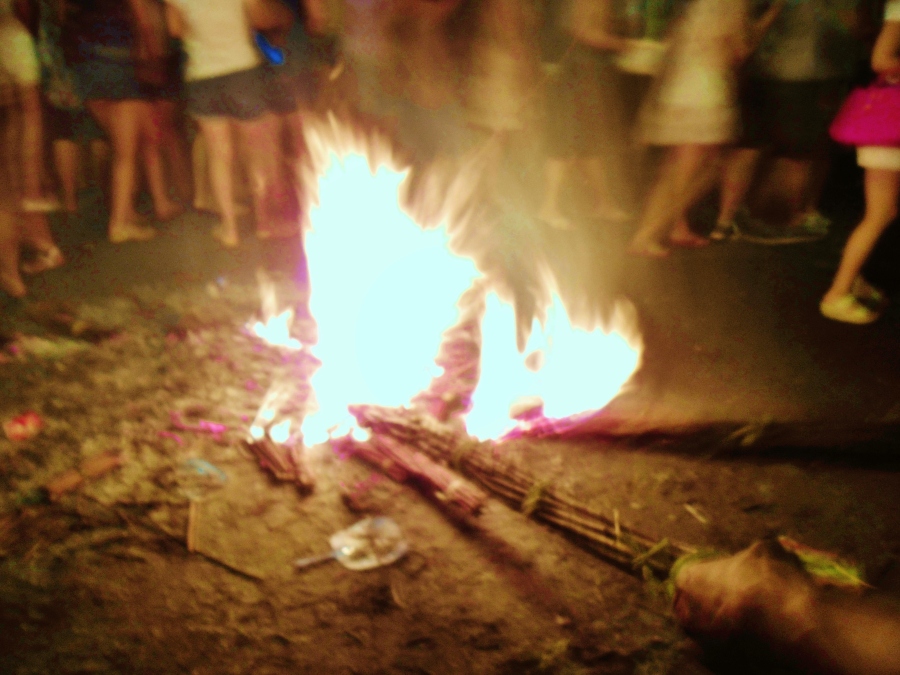Chinese Festivals: Flames of National Pride
‘Life is a festival only to the wise’– Ralph Waldo Emerson
Qingming Festival 清明节
April begins to drape its daily deep blue evening coat across the skyline, wafts of thick grey-black smog hover in the air like fleeting figures of the night, a small family – a sombre faced man and woman with a young boy- sit kneeling surreptitiously on the pavements of a side street burning money while a group of elderly men clothed in white linen rush determinedly into the middle of an 8 lane road. Cars slam to halt, a vociferous shower of vehicle-horn bewailing ensues, yet the silver-haired troup continue on their curious quest as if unphased by death. One of them begins to recite scriptures as the others light a fire, they chant in deep heavy tones, kowtowing in unison before setting alight great 3m high stacks of peony flowers in the road and eloping away into the darkness. Although seemingly swathed in mystery and perhaps not dissimilar to a scene Harry Potter might witness in Diagon Alley, this event would go by unnoticed on the streets of China, where passers by all know the money is fake and the flowers are made of paper as it is merely part of the nationwide commemoration of the dead for the annual Tomb Sweeping Day.
Each April, when the weather is cool, clear and bright, buddhist monks seculded away in the silent mountains of Hua Shan and Tai Shan will awake at 4am to ceremoniously make their presence known by banging the mighty temple gongs and breaking into song in memory of the dead; families will take excursions out into nature, return to the countryside graves of their loved ones, pray in temples and in their homes as well as offer sacrifices to their ancient ancestors, all as part of the Qingming Festival(清明节) , which literally means cool and bright festival as a reflection of the calm spring weather that typically accompanies it. During this Day of the Dead– one of China’s so termed ‘Ghost festivals’- Chinese families will burn candles and incense outside their houses or even on roads to guide the dead so that their souls may find their way back to their homes. Families and friends will also purchase them special ghost money known as Joss paper and all manner of items ranging from flowers, treasured possessions to even food and fridges, which will all then be burnt to ensure that their deceased loved ones and ancestors have all that they desire in the next world.

A man participates in China’s annual Qingming Festival. Chinese tradition dictates that representatives from each Chinese family should light a candle in memory of ancestors and loved ones who have died.
On reflection, Qingming Festival seems to be a decidedly spiritual national tradition for a population that claims to be overwhelming atheist and for a country whose government has earned a reputation in the West for having banned religion of any nature. Most would agree that it is of utmost importance to preserve the cultural heritage of a nation whose cultural traditions have been so severely ravaged by revolution, unrest and dictatorship throughout history and to allow this somewhat stifled nation one rare moment of spiritual contemplation. However, given the ritualistic cremation involved in Qingming Festival proceedings, annual tributes to the dead are posing problems to the living that are becoming increasingly grave in terms of the environment and of safety.
Lin Zhao from a village in Mianyang explained how workers on his farm paid tribute to the dead for last year’s Qingming festival, which resulted in a forest fire on their land that caused minor casualties and extensive damage to their business while during 2011 Chinese New Year celebrations, 6,500 fires were reported to have broken throughout China. Although laws exist to prevent people from lighting roadside fires, fires continue to be set off in all areas across the country for Tomb Sweeping Day and a variety of other Chinese festivals– in parks, city roads, town markets, hillside graveyards, even forests. These small bonfires ceremoniously lit during Chinese festivals in the name of celebration are more often than not spontaneous and unguarded- leading to a large number of country and city fires that often grow out of control and spread quickly.

Waves of ancient Indian culture leave a lasting brightly-coloured footprint on Chinese festival ceremonies.

Many Chinese citizens gather in Buddhist and Taoist temples around the country on Tomb Sweeping Day in spring to commemorate their ancient family ancestors and call on them for protection.
One billion people, one billion bonfires- should more be done to control fires during Chinese Festivals? To what extent do these fires really contribute to pollution and human casualties? Would stricter controls on fire destroy the unique enchantment of Chinese festivals and simply add another government harness on freedom in China? How spiritually constricted a nation are the Chinese? What levels of spirituality and religion among its people does the government tolerate? Do government sanctions on religion reflect a violation of human rights?
For those wanting to learn more, there is a wealth of information available regarding the culture of Qing Ming festival, offerings for the dead, green methods for Tomb Sweeping day, fire levels as seen from space, casualties due to fire and festivals in China, festival lanterns, China’s fire management, fire occurrence, smog levels, coal mines and air pollution. There are also extensive debates on the freedom of religion, spirituality and Falun Gong in Tibet and mainland China as the ruling Chinese Communist party continues to monitor religious practices.
The Torch Festival 火把节
From Tomb Sweeping Day, Tai-Hai fire dragon dance and the lantern festival to the fire walking carnival and the firework-filled Chinese New Lunar Year; the Torch festival is just one more of the bewitching array of wild fire-fueled merrymaking China offers up with burning relish each year.
For centuries, the Yi people of Yunnan have believed in the powerful and spiritual nature of fire, which not only has the ability to keep wickedness at bay, but what’s more, also brings with it the much desired warm promise of a bountiful harvest. Legend has it that the god of heaven once sent down a celestial warrior to exploit the farmers; brave local hero Zhigealu determined to fight for his people however, fervently instructed the villagers to save their land and attack the imposter. The attacker was eventually slain and in a towering rage, the god of heaven unleashed plagues of deadly locusts to ravage the crops, yet they too were no match for quick-witted Zhigealu, who commanded the villagers to light torch fires and banished the insects. Since that time, each year visitors gather in Xichang from all over China to celebrate the harvest season and to commemorate the day when when the god of heaven was conquered by fire.

Night settles over the city, a young boy sells tree branches for torch fires as celebrations for the national Torch Festival commence.

A whirling blaze of light and energy- fire fills the air as thousands excitedly wave their torches and dance to music around roaring bonfires in the roads and alleyways of Xichang.

Festival visitors guard their children and possessions with vigilance for the crowds swarm and the pickpockets begin their soundless moonlit rounds.

A wild assortment of festival goers’ glittering masks and hats and striking multi-coloured festival outfits worn by the Bai and Yi people glisten under the glow of firelight that swims across the streets.
Chinese New Year 新年/春节
The moon’s 12th month cycle draws to a close, the infectious rhythmic beat of drums and gongs echos through halls and down alleyways, colours flash before ones eyes from enormous brightly coloured dancing dragons while fireworks leap into the sky; for the last 3000 years the Chinese nation have been rejoicing in the passing of time and welcoming each new lunar year with a fire crackling bang and a twirling lettuce-eating lion that will bring good fortune.

Lights, lanterns, banners, posters and red dragons- waves of gold and bright crimson fill the streets as families fervently dress their homes in auspicious colours for the new year ahead.

Carefully preserved casks of alcohol are dusted off as preparations for New Year festivities in Sichuan get underway. Only a handful of locals know the closely guarded ancient secret to concocting these intoxicating potions that burst onto one’s tongue with explosions of fine flavour.

Wallowing in sugar and eagerly awaiting nightfall when the hypnotic annual display of end of year fireworks commences, a local boy in his sunday best tucks into a cloud of candy floss in Beijing’s Hutong.

Families stock up on hefty bundles of fireworks and firecrackers that thunder, twirl and dance through the air from nightfall til the early hours in celebration of a New Lunar Year.

Xian Bell Tower proudly drapes on her illuminated golden coat of lights to celebrate the passing of a Lunar Year for the 771st time since her construction.

Fiery lanterns are released out into the depths of flaming jet black skies for the lantern festival.

The Spirit Festival (猜灯谜) marks the last day of New Year proceedings; water lanterns are left floating on the waters of Yilan river so that the ancestors’ spirits may be guided back to help wish their offspring good luck for the coming year.
- If you’re on the lookout for more literature on religion, festivals and fire in China then these are some enticing reads: Heathen Chinese, Balloon News, World Traveler: Asia, World Imagery, Rambling About, Lily Honglei and Facts of Falun
Related articles
- Chinese Harvest Moon Festival (voodooboutique.typepad.com)























Looks amazing! One of a kind!
I love traditional festivals, they are a ton of fun and so beautiful too. Great shots! 🙂
Wow, well said!! This was a very enlightening and entertaining read. Thanks for the like on my blog too! I appreciate it. 🙂
Beautiful photos! Great introduction to all the Chinese Festivals as well!
Hey Rachel! Long time no see. Glad you liked my blog 😀
What’s going on with you these days? You seem to have done a fair bit of travelling since I saw you last.
Great blog. I’m nominating you for the Awesome Blog Content award.
Pingback: Awesome Blog Content award | Nia Simone, Author
Thank you! Nice blog and pictures:)
This was very interesting. I have to wonder, since Chinese are basically atheists, what do they believe about the afterlife, if anything?
Hi Barbara, the Chinese as a nation are regarded as atheist but are in fact very spiritual. Their culture is deeply rooted in the Taoist religion, which is why Emperor Qin Shi Huang built such a large army of terracotta warriors to accompany him into the next world. Today, most Chinese people still loosely believe in some sort of afterlife. According to legend, there is a heaven with many realms where only the gods and immortals reside and a hell that some claim has as many as eighteen levels, each with it’s own excruciating torture methods, while the dead who have not sinned will become immortal or be re-incarnated. Much like earth, these souls must have enough money, which is why so many relatives burn joss paper for deceased loved ones during Qingming festival when souls sent to hell (for reasons such as immorality or not having been given proper funeral proceedings) will return to earth to collect any offerings that have been burned for them.
Pingback: Japan: The Cultural Jigsaw of Old and New | Globe Drifting
That torch festival looks wild! Wish I had made it was on when I was over there.
Absolutely love your blog! Gorgeous photos and insightful posts. Regarding the question/comment about religion/atheism, I echo Rachel’s reply. As one friend explained to me, ancestors are considered very important because they are “closer to the gods”..so a conduit of sorts. Nowadays, many people practice elements of Taoism and Buddhism (Taoism being a bit more a way of life/philosophy for living and Taoist temples often visited for specific purposes like wishing to do well on exams–Confucius is called in on occassion too– with Buddhism being a bit more focused on after life). And, of course, there are a growing # of Christians in China today, too. This practical “blend” is also common in Japan, with Shinto and Buddhism.
The whole issue of religion is of course a bit complex here with recent history, but the traditions and beliefs can be seen esp. strongly during the various festivals.
Howdy! Someone in my Facebook group shared this site with us so I came to check it out. I’m definitely loving the information.
What an amazing post, beautifully written and stunning photos! Thank you!